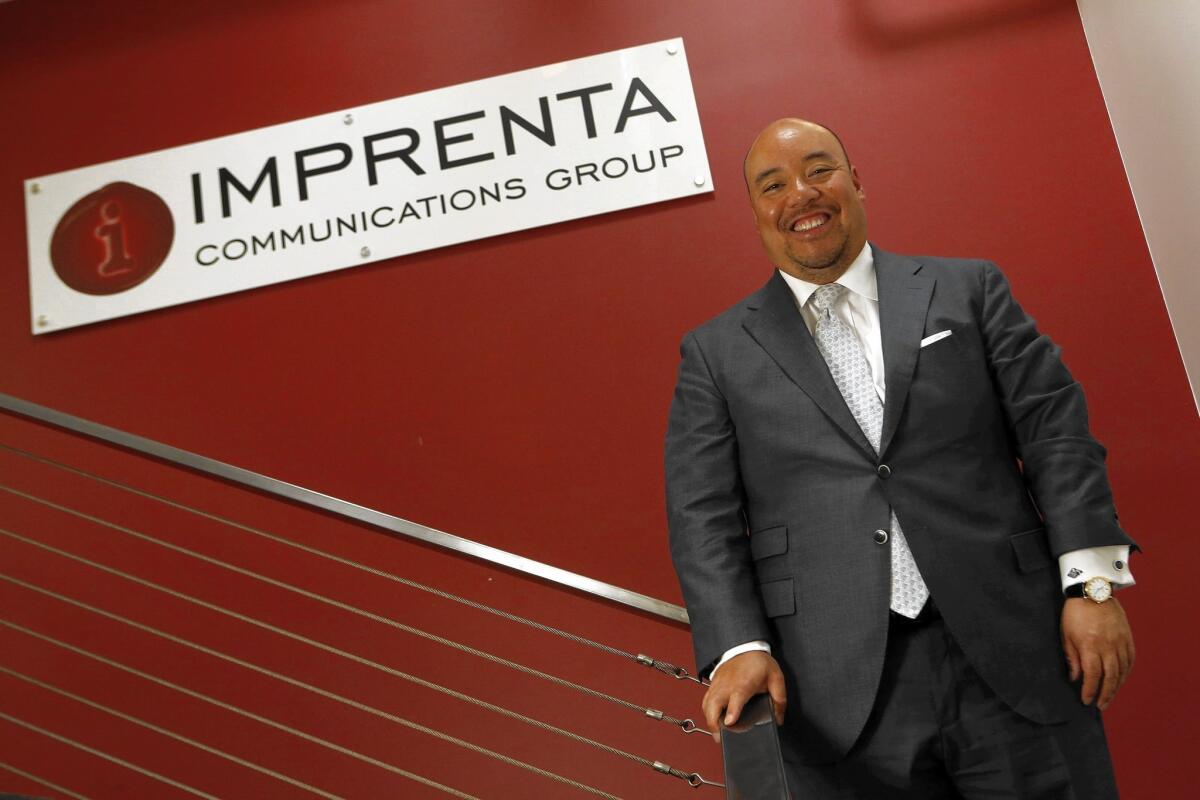How I Made It: Ronald Wong helps businesses and others reach out to people of color

- Share via
The gig: Ronald W. Wong, 49, is the founder and president of Imprenta Communications Group in Pasadena. Imprenta surged this year into the Inc. 500 list of the nation’s fastest-growing privately held companies, at No. 413, from well back in the 1,000s the previous year. Wong is passionate about what he calls “social marketing,” taking on jobs that ensure that communities of color are informed “in a way that recognizes their diversity and shows a knowledge and respect for their culture.” Imprenta has managed communications and marketing projects for clients including Pacific Gas & Electric, the California Student Aid Commission, the Los Angeles Unified School District and the California Department of Insurance.
Growing demand: The 14-year-old company has grown from an initial workforce of two to 20 and is on track for a record year. “We will probably have about $20 million in revenues this year,” Wong said, up from about $18 million last year. “There is never a shortage of work for us, particularly in the Asian and Latino communities.” Imprenta’s work has won it an award of excellence in multicultural communications programs from the Public Relations Society of America. Imprenta has also won more than a dozen “Pollie” awards from the American Assn. of Political Consultants.
Electoral inspiration: Wong grew up in Monterey Park, went to Alhambra High School and studied political science at UCLA, having decided early on that he wanted to be involved in politics. In fact, Wong and a high school debate team partner, Tom, used to talk about “what was right and wrong about society and how we were going to change the world,” Wong said. They haven’t done badly. Thomas A. Saenz, the debate team buddy, is the president and general counsel of the Mexican American Legal Defense and Educational Fund.
Making connections: During Wong’s sophomore year at UCLA, he was volunteering at Nisei Week, the annual festival in Little Tokyo that promotes Japanese American culture. Wong saw a car carrying then state Sen. Art Torres. Wong, 19 at the time, promptly walked up to the car and said, “Hey, I want to do an internship.” Torres, without a pause, said yes. “He was my first political boss.”
Find mentors: “After college, I had great mentors. One I met at UCLA suggested I do a California Executive Fellowship in Sacramento,” Wong said. That was Rick Tuttle, who served as Los Angeles city controller from 1985 to 2001. “I think he saw a lot of enthusiasm and idealism in me,” Wong said. Wong was chief deputy appointments secretary for Gov. Gray Davis from 1998 to 2001. In 1996, Wong was tapped to be deputy political director for the California Clinton/Gore presidential campaign.
Sharpening focus: In 1994, Wong was a founding partner of Lang, Murakawa & Wong, which did strategic communications and public relations as well as consulting and public affairs work. “Because no one was reaching out to ethnic voters, we took that niche on,” Wong said.
Own shop: Wong started Imprenta Communications in 2001. “We’re a public affairs advertising firm,” Wong said, “but our roots are in politics. We started out as political consultants, helping candidates with their campaigns, advertising and media strategies.” Wong’s firm targets African American, Asian and Latino communities because “I’ve sat in too many rooms where I was the only person of color.”
Early win: Wong worked for the “no” campaign in the 2002 voter initiative to take over PG&E. Funders told Wong they wouldn’t spend much on winning the Asian vote because their polling showed a clean 33% split among Asians among the yes, no and uncommitted positions. “Your polling is wrong,” Wong recalled saying. Wong said his firm helped deliver more than 60% of the Asian vote for the “no” campaign because “intuitively I knew in my heart that Asian voters would not like to take over a utility or private sector company. We did some targeted mailings and paid advertising, reaching out in Mandarin instead of just English,” Wong said. “Treat people with genuine respect, speak to them in their own language and they will respond to you.”
Wage theft: One of Wong’s favorite campaigns involved two years of targeting mostly Latino workers to inform them how and where to report wage theft, “if they are not getting their tips, if they are not getting a lunch break. To me, that is significant work.”
Leadership style: “It’s a mix between fairly hands on and delegation,” Wong said.
Personal: The Los Angeles resident, father to a 3-year-old daughter, doesn’t have a lot of free time. So he likes to spend it trying to hit a ball with a stick into a hole, attempting to bring his score below 100. “I love golf even though I am a horrible golfer,” Wong said.
More to Read
Inside the business of entertainment
The Wide Shot brings you news, analysis and insights on everything from streaming wars to production — and what it all means for the future.
You may occasionally receive promotional content from the Los Angeles Times.











